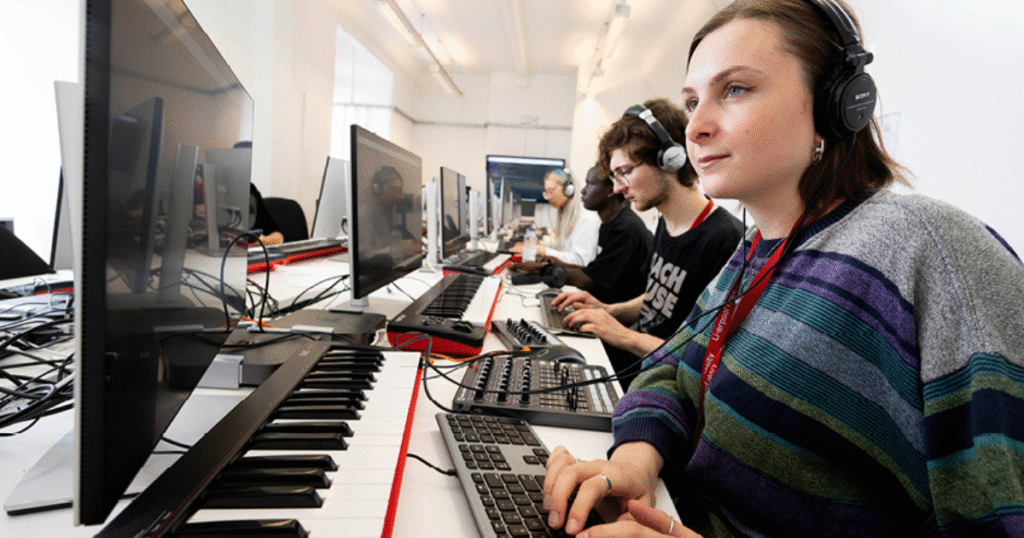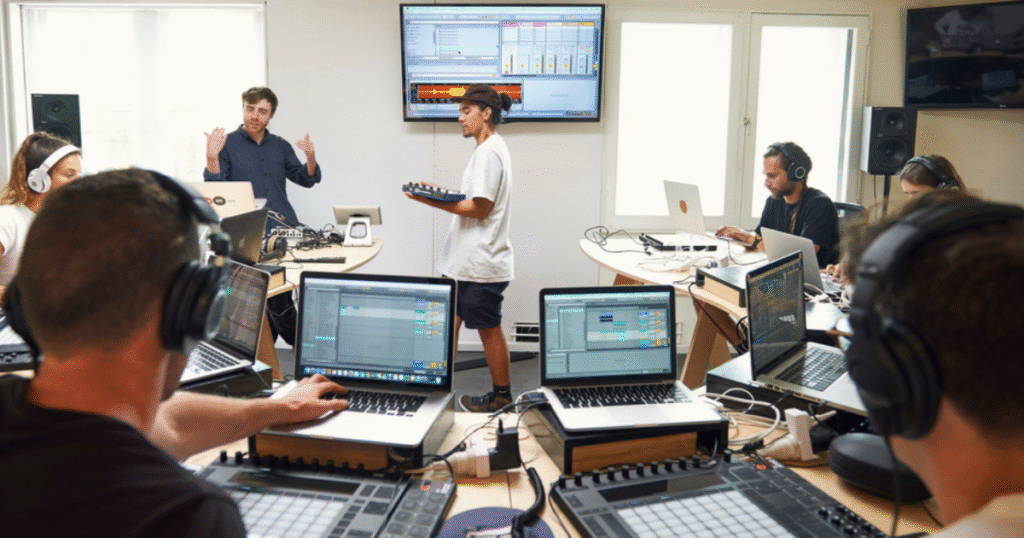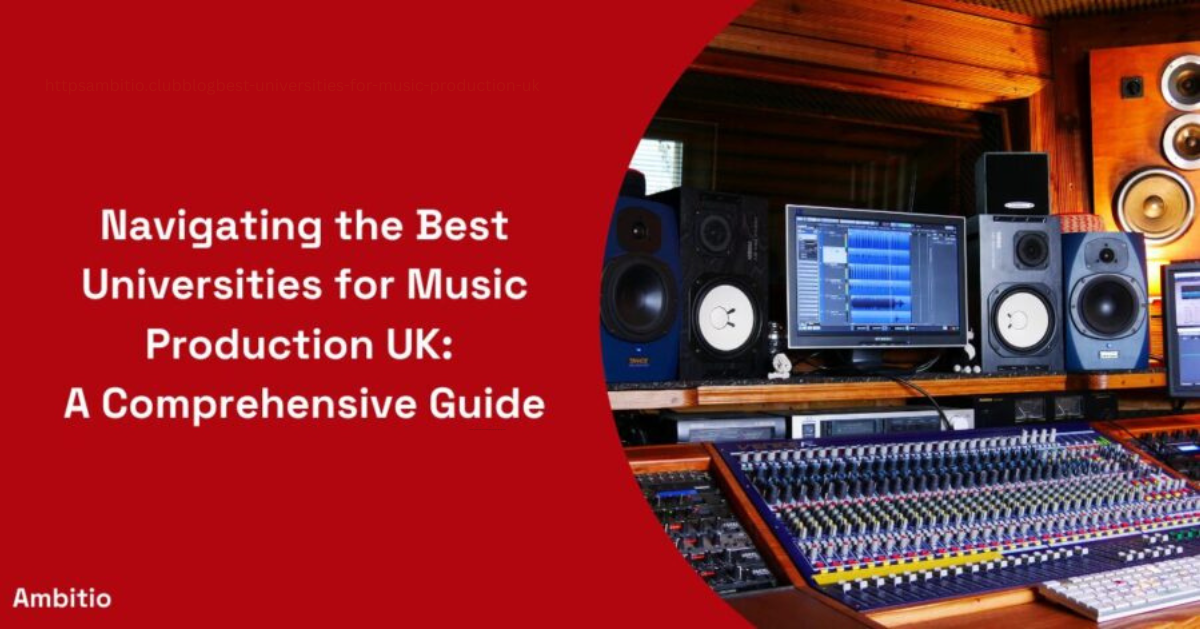Music production is a vibrant and dynamic field that combines creativity with technical skill. For many aspiring music producers, the UK has become a hub of education and innovation in this area. There are numerous universities in the UK that offer specialized courses in music production.
Music production involves the process of creating, recording, and shaping music to create a final piece that is ready for release. This process can include everything from composing, recording, arranging, mixing, and mastering music. It’s an exciting and challenging career that requires both creativity and technical expertise.
These programs cover various aspects, such as sound engineering, music theory, production techniques, and more. This article explores the different music production courses offered by UK universities, the benefits of studying music production, and what students can expect from these programs.
Why Choose Music Production?
Choosing a career in music production can be both rewarding and fulfilling. For many, it’s not just a job but a passion. Music production allows individuals to express their creativity while also working with the latest technology. Some of the reasons why students choose music production courses include:
- Passion for music.
- The opportunity to work with artists.
- The ability to shape sound and music.
- Access to state-of-the-art equipment and software.
Music production is also a rapidly growing field, with many opportunities for students to find work in various sectors, from recording studios to film and video game soundtracks.
The UK As A Music Production Hub
The UK has long been a leader in the music industry. From iconic bands to world-class record producers, the UK has produced some of the most influential figures in the music world. Studying in the UK provides students with an opportunity to immerse themselves in this rich musical heritage. Furthermore, the UK is home to some of the best universities and institutions offering top-notch music production programs.
Types Of Music Production Courses in The UK
Music production courses in the UK can vary depending on the university. Some programs are more technical and focus on sound engineering and production skills, while others might focus more on the creative side of music-making, such as composing and arranging music. Here are some of the common types of music production courses you can find in the UK:
- Bachelor’s Degree in Music Production: This is a comprehensive program that covers all aspects of music production.
- Master’s Degree in Music Production: For those looking to specialize further or enhance their skills in music production.
- Diploma in Music Production: A shorter program for those looking to get started quickly in the industry.
- Online Courses: Many UK institutions offer online programs, providing flexibility for students who want to learn at their own pace.
Key Skills Taught in Music Production Courses
Music production courses teach a variety of skills essential for success in the industry. Some of the key skills include:
- Sound Recording: Learning how to record high-quality sound using different microphones and recording equipment.
- Mixing and Mastering: The process of balancing all the elements of a track and making sure it sounds polished and professional.
- Music Theory: A foundation in music theory helps students understand how music is structured.
- Software Knowledge: Familiarity with digital audio workstations (DAWs) like Pro Tools, Ableton Live, and Logic Pro is essential.
- Creativity: Students are encouraged to develop their unique sound and style.
Top UK Universities Offering Music Production Courses
Several prestigious universities and institutions in the UK offer specialized music production programs. These include both well-established institutions and those with modern, cutting-edge facilities. Some of the top universities offering music production courses include:
- University of Westminster: Offers a wide range of music-related programs, including music production.
- University of Southampton: Known for its advanced courses in music technology and production.
- University of Hertfordshire: Offers both undergraduate and postgraduate courses in music production.
- BIMM London: The British and Irish Modern Music Institute offers specialized courses in music production.
- Guildhall School of Music & Drama: Offers highly regarded courses in music production and technology.
Facilities And Equipment in The UK Universities
UK universities that offer music production courses provide students with access to state-of-the-art facilities and equipment. These facilities are crucial for developing the technical skills necessary to succeed in the industry. Students have access to:
- Recording Studios: Equipped with high-end microphones, mixers, and soundproof rooms.
- Software: DAWs, plugins, and other production software are available for students.
- Live Rooms: Space for bands and artists to record music.
- Technology: High-performance computers and other technology to handle demanding production tasks.
industry Connections And Networking Opportunities
One of the major advantages of studying music production at a UK university is the industry connections and networking opportunities available. Many programs are designed to expose students to the professional music industry through:
- Guest Speakers: Professionals in the industry are often invited to give lectures and share their experiences.
- Internships: Opportunities for students to work in real-world settings, such as recording studios or with music producers.
- Collaborative Projects: Many courses encourage students to collaborate with other musicians and producers.
Career Opportunities in Music Production
A degree in music production opens the door to numerous career opportunities. Graduates can work in various sectors, including:
- Record Labels: Working as a producer, sound engineer, or studio technician.
- Film and TV: Creating soundtracks, designing sound effects, or composing for media.
- Live Sound: Working on the technical side of live performances and concerts.
- Freelance: Many music producers choose to work independently, offering their skills to a variety of clients.
The Role Of Music Production in Modern Music
Music production plays a crucial role in modern music. Producers shape the sound of a track, determine its arrangement, and guide the overall vision of the project. In today’s music industry, the producer is often just as important as the artist. With advancements in technology, the role of the music producer has evolved, and they now have access to a wide range of tools to enhance their craft.

Challenges in Music Production
While music production is an exciting field, it also comes with challenges. Some of the common challenges students might face include:
- Technical Difficulties: Working with complex equipment and software can sometimes be frustrating.
- Creative Block: Coming up with fresh, innovative ideas can be difficult at times.
- Pressure: The music industry is competitive, and producers must constantly push themselves to improve their skills.
Student Support in UK Music Production Courses
Most UK universities provide a range of support services for music production students. These services include:
- Academic Support: Tutors and professors are available to help students with their coursework and projects.
- Career Guidance: Many institutions offer career services to help students find internships and jobs after graduation.
- Technical Support: Assistance with using production software and equipment is often available.
Cost Of Music Production Courses in The UK
The cost of music production courses in the UK varies depending on the institution and the level of study. On average, undergraduate programs can cost between £9,000 and £15,000 per year for UK students, while postgraduate programs may cost more. International students may face higher tuition fees.
How To Apply For Music Production Courses in The UK?
Applying for a music production course in the UK involves several steps. The general application process includes:
- Application Form: Completing an online application through the UCAS system or the university’s own portal.
- Portfolio: Many programs require a portfolio of work, which could include recordings, compositions, or projects.
- Interview: Some universities conduct interviews as part of the selection process.
- Proof of Qualifications: You will need to provide your academic qualifications and English language proficiency.
Online Music Production Courses in The UK
For those who prefer the flexibility of online learning, many UK universities offer online music production courses. These programs allow students to study from anywhere in the world while still receiving a high-quality education.
Online programs may also be more affordable than traditional on-campus courses. Students can study at their own pace, making it easy to balance learning with other commitments. Many courses are taught by experienced industry professionals who provide expert guidance.
Some universities even offer certifications or degrees upon completion. Online learning makes it accessible for people all over the world to pursue a career in music production.
Music Production Equipment And Software
Students studying music production in the UK will become familiar with a range of equipment and software. Some of the most common tools include:
- Digital Audio Workstations (DAWs): Programs like Ableton Live, Logic Pro, and Pro Tools.
- Audio Interfaces: Hardware used to connect instruments and microphones to computers.
- Microphones: Different types of microphones for recording vocals and instruments.
- Monitors and Headphones: High-quality speakers and headphones for mixing and listening.
Jobs After Graduation in Music
Graduates of music production courses in the UK have a wide range of job prospects. Some of the most common roles for graduates include:
- Music Producer: Overseeing the creation of music in a studio setting.
- Sound Engineer: Responsible for recording and mixing sound.
- Composer: Writing music for various media, such as films, video games, and commercials.
- Live Sound Technician: Managing sound equipment for live events and concerts.
Future Trends in Music Production
Many courses now offer opportunities to learn about music production for video games, films, and social media platforms. As technology continues to evolve, the field of music production is also changing. Some of the future trends in music production include:
- Artificial Intelligence: AI is being used to create music and assist producers with tasks like mixing and mastering.
- Virtual Reality (VR): VR is being used to create immersive music experiences.
- Collaboration Tools: Online tools are allowing producers to collaborate in real-time from different parts of the world.
Universities are also emphasizing creativity, encouraging students to experiment with different sounds and genres. Overall, the future of music production courses in the UK looks exciting, with a blend of traditional and modern skills.

Frequently Asked Questions
What qualifications do I need to study music production?
Most programs require A-levels or equivalent qualifications. Some courses may also require a portfolio of work.
Can I study music production online?
Yes, many UK universities offer online music production courses for those who prefer flexible learning.
What software will I learn to use in a music production course?
Common software includes Ableton Live, Logic Pro, and Pro Tools.
How much does a music production course cost in the UK?
Tuition fees typically range from £9,000 to £15,000 per year for UK students, with higher fees for international students.
Final Thoughts
Music production courses in the UK offer a great opportunity for aspiring producers to develop their skills and enter a dynamic and growing industry. With state-of-the-art equipment, experienced tutors, and strong industry connections, students are well-equipped to succeed in this field.

